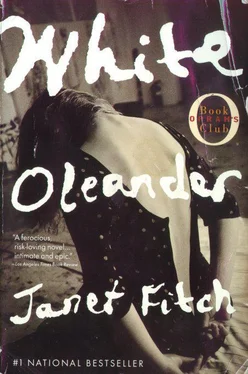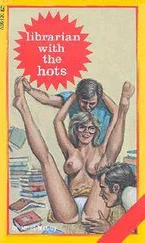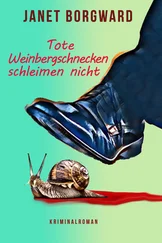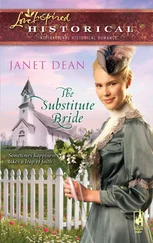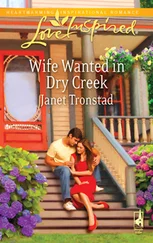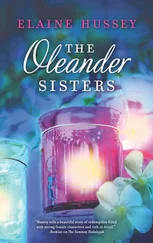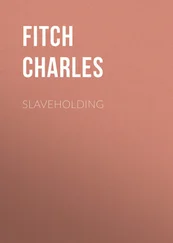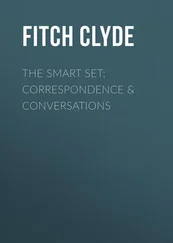Janet Fitch - White Oleander
Здесь есть возможность читать онлайн «Janet Fitch - White Oleander» весь текст электронной книги совершенно бесплатно (целиком полную версию без сокращений). В некоторых случаях можно слушать аудио, скачать через торрент в формате fb2 и присутствует краткое содержание. Жанр: Современная проза, на английском языке. Описание произведения, (предисловие) а так же отзывы посетителей доступны на портале библиотеки ЛибКат.
- Название:White Oleander
- Автор:
- Жанр:
- Год:неизвестен
- ISBN:нет данных
- Рейтинг книги:3 / 5. Голосов: 1
-
Избранное:Добавить в избранное
- Отзывы:
-
Ваша оценка:
- 60
- 1
- 2
- 3
- 4
- 5
White Oleander: краткое содержание, описание и аннотация
Предлагаем к чтению аннотацию, описание, краткое содержание или предисловие (зависит от того, что написал сам автор книги «White Oleander»). Если вы не нашли необходимую информацию о книге — напишите в комментариях, мы постараемся отыскать её.
White Oleander — читать онлайн бесплатно полную книгу (весь текст) целиком
Ниже представлен текст книги, разбитый по страницам. Система сохранения места последней прочитанной страницы, позволяет с удобством читать онлайн бесплатно книгу «White Oleander», без необходимости каждый раз заново искать на чём Вы остановились. Поставьте закладку, и сможете в любой момент перейти на страницу, на которой закончили чтение.
Интервал:
Закладка:
My knee touched hers, recoiled. Her leg was stiff. She was far away now, she was passing through the seven mortal coils, going up to God. I ran my fingers down the pretty, pointed nose, along the smooth forehead, the slight indentation at the temple where no pulse fluttered. She never seemed more complete, more sure of herself. Not trying to please anyone anymore.
She loved me, but she didn’t know me now.
From 1:45 to 4:15 the phone rang five times. She missed her hair appointment with Emile. Two hang-ups. Ron’s friends were meeting for drinks at Cava. MCI wanted to give the Richardses a break on their phone bill. Each time the phone rang, I somehow expected her to jerk awake and answer it. She could never stand not answering the phone. Even when she knew it wouldn’t be for her. It might be a job, though she’d stopped going out on auditions. It might be a friend, though she had no friends. She could get involved in long winding conversations with boiler room operators, Red Carpet Realty, Gold Star Construction.
I couldn’t understand how she could be gone. What would happen to the way she had of opening a jar like an orchestra percussionist hitting a triangle, a single precise gesture? The reddish highlights in her hair in the summertime. Her aunt who served at Ypres. I was the one who had them now, like an armload of butterflies. Who else knew she put mirrors on the roof, or that her favorite movies were Dr. Zhivago and Breakfast at Tiffany’s , that her favorite color was indigo blue? Her lucky number was two. The foods she could never eat were coconut and marzipan.
I remembered the day she took me to Cal Arts. I was intimidated by the students, they seemed pretentious for people with funny haircuts, and their work was ugly. It cost ten thousand dollars a year to go there. “Don’t think about money,” Claire said. “This is the place, unless you think you want to go east.” We’d sent in the application in November. I had to forget all that now.
I sat cross-legged next to her on the bed, counted the pills in the jar. For Insomnia. There were still plenty. More than enough, and the last person who would ever think about me was gone. My mother? She just wanted possession. She thought if she could kill Claire, she would get me back, so she could erase me some more. I felt the pull of that dark circle, the neck of the bottle. It was a rabbit hole, I could jump down it and pull it in after me. You never knew when help might come. But I knew. It came and I turned my back, I let it go down. I pushed my savior out of the life raft. I panicked. Now I reaped my despair.
I sat with the jar in my hand, watching that winter sky’s blush, weak pink strained through blue haze, coming through the angle-pruned branches and weeping boughs of the elm. Sunset came so early now. She loved this time of day, loved feeling beautifully melancholy and sitting under the elm, looking up into its branches, dark against the sky.
In the end, I didn’t take the pills. It seemed too grandiose, a big gesture, fraudulent. I didn’t deserve to forget that I had turned my back on her. Oblivion wiped the books clean. It was too easy. I was the keeper of the butterflies now. Instead, I dialed Ron’s pager, added the 999 that meant emergency. I sat back down and waited.
RON SAT NEXT TO ME on the bed, his shoulders sagging like an old horse’s back and his face pressed into his hands, as if he could not look at one more thing. “You were supposed to watch her,” he said.
“You were the one who left.”
He gasped, and broke into long, shuddering sobs. I never thought I would feel sorry for Ron, but I did. I put my hand on his shoulder, and he pressed his hand over mine. It occurred to me I could make him feel better. I could stroke his hair, and say, It’s not your fault. She had problems we couldn’t have helped, no matter what we did. That’s what Claire would have done. I could have made him love me. Maybe he would keep me.
He held my hand and stared down at her silk slippers beside the bed. “I’ve been afraid of this for years.”
He pressed my hand to his cheek. I could feel his tears spill over the back, seeping between my fingers. Claire would have felt sorry for him if she weren’t dead. “I loved her so much,” he said. “I wasn’t a saint, but I loved her. You don’t know.”
He looked up at me with his red-rimmed eyes, waiting for me to deliver my lines. I know you did, Ron. Claire would say it. I could feel Olivia too, pressing me. He could take care of me. A man’s world!
But I couldn’t bring myself to do it. Claire was dead. What did it matter if he loved her or not?
I pulled my hand away and got up, started picking up some of the things I’d thrown on the floor. There was his Cross pen. I tossed it in his lap. “She had it all the time,” I said. “You didn’t know her at all.”
He bent his head, touched her dark hair that I had brushed, ran his hand down her mauve angora sleeve. “You can still stay,” he said. “Don’t worry about that.”
I thought it was what I’d wanted to hear. But now that he said it, I knew I’d feel better out on Sunset Boulevard with the other runaways, asleep on a piss quilt on the steps of the homeless church, eating out of the trash at Two Guys from Italy. I couldn’t stay here without Claire. I could never say the lines he wanted, paint on my prettiest smile, listen for his car in the driveway. My face in the vanity mirror was sharp and jagged. He was reaching out to me, but my face was beyond reaching.
I turned away and looked out at the night and our reflection in the broken French doors: me in my silk pajamas, Ron on the bed, Claire on the pillow, bathed in the bed’s lampside glow, for once utterly indifferent.
“Why couldn’t you just have loved her more?” I said.
His hand dropped down. He shook his head. Nobody knew why. Nobody ever knew why.
IT TOOK LONGER to pack than when I left Amelia’s. There were all the new clothes Claire gave me, the books, the little Dürer rabbit. I took everything. I only had one suitcase, so I packed the rest in shopping bags. It took seven bags to pack it all. I went into the kitchen, reached into the jewelry bag, and took the aquamarine ring that was always too big for her, and her mother too. But it fit me fine.
It was almost midnight when a caseworker came in a minivan, a middle-aged white woman in jeans and pearl earrings. Joan Peeler had left DCS last year to work in development at Fox. Ron helped me carry my things out to the van. “I’m sorry,” he said as I climbed in. He fumbled for his wallet, pressed some money on me. Two hundred-dollar bills. My mother would have thrown them in his face, but I took them.
I watched the house, the way it got smaller in the back window of the van as we drove off in the moonless night, the end of what might have been. A little Hollywood bungalow beyond the huge white trunks of the sycamores. I didn’t give a damn what happened to me now.
22
MACLAREN CHILDREN’S CENTER was in a way a relief. The worst had happened. The waiting was over.
I lay in my narrow bed, low to the ground. Except for the two changes of clothes in the pressboard drawers beneath the mattress, all my things were in storage. My skin burned. I’d been de-loused and still stank of coal-tar soap. Everyone was asleep but the girls in the hall, girls who had to be watched, the suicide girls, the epileptics, the uncontrollables. It was finally quiet.
Now I found it easy to imagine my mother in her bunk at Frontera. We weren’t so different after all. The same block walls, linoleum floors, the shadows of pines against the outside lights, and the sleeping shapes of my roommates under their thin thermal blankets. It was too hot in here, but I didn’t open the window. Claire was dead. Who cared if it was too hot.
Читать дальшеИнтервал:
Закладка:
Похожие книги на «White Oleander»
Представляем Вашему вниманию похожие книги на «White Oleander» списком для выбора. Мы отобрали схожую по названию и смыслу литературу в надежде предоставить читателям больше вариантов отыскать новые, интересные, ещё непрочитанные произведения.
Обсуждение, отзывы о книге «White Oleander» и просто собственные мнения читателей. Оставьте ваши комментарии, напишите, что Вы думаете о произведении, его смысле или главных героях. Укажите что конкретно понравилось, а что нет, и почему Вы так считаете.
